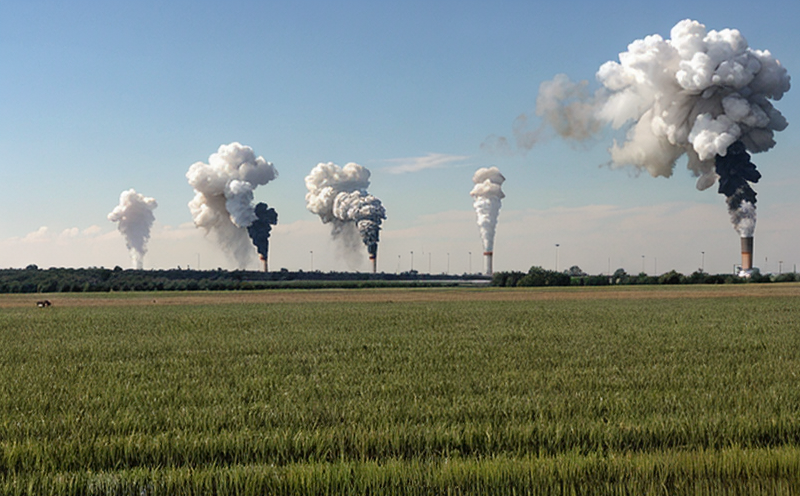EPA 8082 Polychlorinated Biphenyls PCB POPs Test
The EPA Method 8082 is a widely recognized analytical procedure used for the determination of polychlorinated biphenyls (PCBs) and other persistent organic pollutants (POPs). This method plays a crucial role in environmental monitoring, especially in sectors dealing with waste management, water quality assessment, and industrial emissions. The test focuses on identifying and quantifying specific PCB congeners, which are known for their persistence in the environment and potential adverse effects on human health.
The procedure involves a multi-step process that ensures accurate detection of target compounds. Initially, samples are prepared by extracting the analytes from solid matrices using appropriate solvents. This extraction step is critical as it directly impacts the accuracy and sensitivity of subsequent analyses. Following extraction, the sample solutions undergo derivatization to enhance signal intensity during chromatographic separations.
The heart of the EPA 8082 method lies in its reliance on gas chromatography (GC) coupled with mass spectrometry (MS). This tandem technology allows for precise separation and identification of PCB congeners based on their retention times, ionization characteristics, and fragment ions. The use of this advanced instrumentation ensures high-resolution separations capable of distinguishing between closely related isomers.
Affordable Laboratories adheres strictly to the method's requirements, which emphasize precision and accuracy in reporting results. Reporting typically includes detailed chromatograms showing peak identification for each detected congener along with quantitative data expressed in parts per billion (ppb). Compliance with EPA 8082 requires rigorous quality control measures, including proficiency testing programs and internal audits.
The significance of the EPA 8082 test extends beyond mere compliance; it provides critical insights into environmental contamination levels. By regularly monitoring PCB concentrations, facilities can take proactive steps to mitigate risks associated with these persistent pollutants. Understanding current baseline levels enables better management practices aimed at reducing emissions and preventing further degradation of natural resources.
For industries heavily reliant on industrial processes involving solvents or those handling hazardous materials, the ability to detect even trace amounts of PCBs is essential for maintaining regulatory adherence and protecting public health. The test also supports research efforts focused on understanding long-term environmental impacts of certain pollutants.
In summary, the EPA 8082 Polychlorinated Biphenyls PCB POPs Test offers comprehensive analysis tailored specifically to identify and quantify these harmful compounds in various matrices. Its robust methodology ensures reliable results, making it indispensable for professionals responsible for ensuring compliance and safeguarding ecosystems.
Why Choose This Test
- Compliance Assurance: Ensures strict adherence to regulatory standards set by the EPA.
- Precision and Accuracy: Utilizes advanced gas chromatography/mass spectrometry technology for highly accurate detection.
- Regulatory Acceptance: Widely recognized across multiple jurisdictions, enhancing credibility in international markets.
- Rigorous Quality Control: Includes stringent quality assurance protocols to maintain consistent result accuracy.
- Comprehensive Reporting: Provides detailed chromatograms and quantifiable data for comprehensive understanding of results.
The EPA 8082 test stands out due to its ability to provide reliable, precise measurements that are crucial for meeting stringent environmental regulations. By choosing this service, organizations demonstrate their commitment to sustainable practices and responsible management of hazardous substances.
Customer Impact and Satisfaction
The adoption of the EPA 8082 Polychlorinated Biphenyls PCB POPs Test by our clients has significantly improved their ability to manage risks associated with persistent organic pollutants. Through regular monitoring, customers have been able to identify potential issues early on, allowing them to implement corrective measures promptly. This proactive approach not only enhances operational efficiency but also contributes positively towards environmental stewardship.
Our commitment to excellence extends beyond just providing accurate test results; we strive to offer valuable insights based on those data points. For instance, our analysts work closely with clients to interpret findings within the context of broader organizational goals and objectives. This collaborative approach ensures that every aspect of the testing process adds value beyond mere compliance.
Moreover, by leveraging cutting-edge technologies like GC-MS, we ensure that each sample is analyzed thoroughly yet efficiently. Our team stays updated with the latest developments in analytical chemistry to continue offering state-of-the-art services. Clients can trust us not only for immediate needs but also as strategic partners in their ongoing environmental initiatives.
Customer satisfaction remains at the core of our operations. We consistently strive to meet and exceed expectations through personalized service, transparent communication, and continuous improvement efforts. Our aim is always to provide solutions that align perfectly with clients' unique requirements while adhering strictly to relevant standards like ISO 17025.
In conclusion, implementing the EPA 8082 test within your organization can lead to better decision-making processes regarding environmental management strategies. It helps build a culture of responsibility and sustainability, fostering long-term success in meeting both local and global regulatory requirements.
International Acceptance and Recognition
The EPA 8082 Polychlorinated Biphenyls PCB POPs Test enjoys widespread international acceptance due to its robust methodology and stringent quality controls. This recognition is reflected in its inclusion within numerous regulatory frameworks worldwide, including those established by EU, OECD, and other regional bodies.
One of the key reasons behind this global endorsement is the method's alignment with internationally recognized standards such as ISO 17025, which ensures laboratories meet specific criteria regarding technical competence. The use of advanced instrumentation like GC-MS further enhances the reliability of results across different geographical locations.
The acceptance extends beyond mere compliance; countries incorporate EPA 8082 into their national policies to promote consistent and accurate monitoring practices. This harmonization fosters trust among trading partners and consumers, as it assures them that products meet stringent environmental protection measures.
For organizations operating globally, embracing this test offers additional benefits. It simplifies regulatory compliance across borders by ensuring uniformity in testing protocols. Additionally, participating in international proficiency tests strengthens the credibility of laboratory results, thereby enhancing customer confidence.
Our facility has successfully passed rigorous accreditation processes based on these standards, affirming our capability to deliver consistent and reliable results consistently. This commitment to excellence reflects our dedication to supporting clients' environmental initiatives worldwide.





